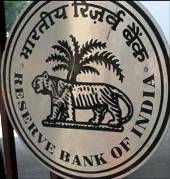 Deteriorating asset quality and depleting capital adequacy have made banks opt for safer investment avenues, such as government securities.
Deteriorating asset quality and depleting capital adequacy have made banks opt for safer investment avenues, such as government securities.
The Reserve Bank of India, in its Macroeconomic and Monetary Developments report on Monday, said sharp deceleration in economic activities had resulted in poor credit offtake.
And, some parameters indicated deteriorating health of banks' balance sheets.
This has made lenders seek refuge in 'safer' investment avenues, resulting a 'compositional' shift in banks' asset portfolio in favour of investments in government securities.
"Banks tend to become risk-averse, as corporate profitability impinges on the health of their balance sheets and the possibility of adverse selection increases in a rising interest rate environment," it said.
RBI said the capital adequacy ratio of public sector banks had declined during 2011-12.
"These factors appear to have a bearing on their capacity to extend credit," it said.
Adding: "On the demand side, with the transmission of cumulative monetary actions having a desired impact on economic activity, particularly credit-intensive
On the supply side, banks appeared to be averse to taking risks, with some parameters that indicate the health of banks' balance sheets deteriorating during the year."
Though all the sectors in the economy contributed to the decline in non-food credit growth, the deceleration was more in agriculture, real estate, hotels and restaurants, professional services, telecommunication, power, cement, textiles, iron and steel and personal vehicle loans, the central bank said.
Advances by banks recorded a year-on-year growth of 19.4 per cent till March 30, 2012, against 21.5 per cent a year before.
Similarly, term deposit growth decelerated during the fourth quarter of 2011-12, reflecting tight liquidity conditions and higher base effect, RBI said.
As on March 31, time deposits grew 15.4 per cent on a year-on-year basis, as compared with 18.3 per cent in the corresponding period a year before.












 © 2025 Rediff.com -
© 2025 Rediff.com -